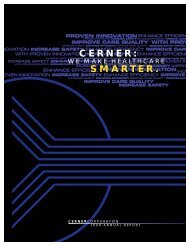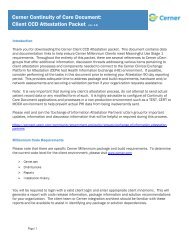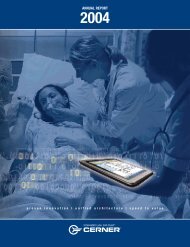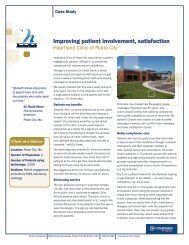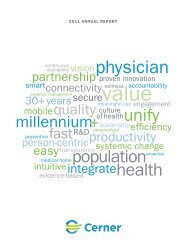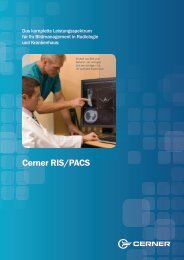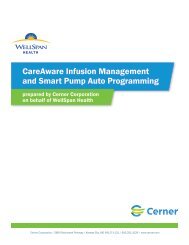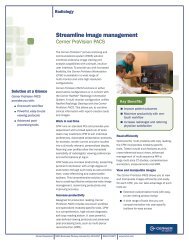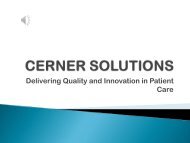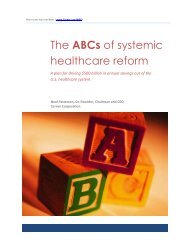The ABCs of systemic healthcare reform - Cerner Corporation
The ABCs of systemic healthcare reform - Cerner Corporation
The ABCs of systemic healthcare reform - Cerner Corporation
- No tags were found...
You also want an ePaper? Increase the reach of your titles
YUMPU automatically turns print PDFs into web optimized ePapers that Google loves.
warranties concerning material errors and other matters. Failure <strong>of</strong> a client's <strong>Cerner</strong> s<strong>of</strong>tware solutions and/or <strong>healthcare</strong><br />
devices to meet these warranties could constitute a material breach under the client agreement, allowing the client to terminate<br />
the agreement and possibly obtain a refund and/or damages, or might require us to incur additional expense in order to make<br />
the s<strong>of</strong>tware solution or <strong>healthcare</strong> device meet these criteria. Our client agreements generally limit our liability arising from<br />
such claims but such limits may not be enforceable in certain jurisdictions or circumstances. Although we maintain liability<br />
insurance coverage in an amount that we believe is sufficient for our business, there can be no assurance that such coverage<br />
will cover any particular claim that has been brought or that may be brought in the future, prove to be adequate or that such<br />
coverage will continue to remain available on acceptable terms, if at all. A successful material claim or series <strong>of</strong> claims brought<br />
against us, if uninsured or under-insured, could materially harm our business, results <strong>of</strong> operations and financial condition.<br />
We may experience interruption at our data centers or client support facilities. We perform data center and/or hosting<br />
services for certain clients, including the storage <strong>of</strong> critical patient and administrative data. In addition, we provide support<br />
services to our clients through various client support facilities. We have invested in reliability features such as multiple power<br />
feeds, multiple backup generators and redundant telecommunications lines, as well as technical and physical security<br />
safeguards, and structured our operations to reduce the likelihood <strong>of</strong> disruptions. However, complete failure <strong>of</strong> all generators,<br />
impairment <strong>of</strong> all telecommunications lines, damage (environmental, accidental, intentional or pandemic) to the buildings, the<br />
equipment inside the buildings housing our data centers, the client data contained therein and/or the personnel trained to<br />
operate such facilities could cause a disruption in operations and negatively impact clients who depend on us for data center<br />
and system support services. Any interruption in operations at our data centers and/or client support facilities could damage<br />
our reputation, cause us to lose existing clients, hurt our ability to obtain new clients, result in revenue loss, create potential<br />
liabilities for our clients and us and increase insurance and other operating costs.<br />
Our proprietary technology may be subject to claims for infringement or misappropriation <strong>of</strong> intellectual property rights <strong>of</strong><br />
others, or may be infringed or misappropriated by others. We rely upon a combination <strong>of</strong> license agreements, confidentiality<br />
procedures, employee nondisclosure agreements, confidentiality agreements with third parties and technical measures to<br />
maintain the confidentiality and trade secrecy <strong>of</strong> our proprietary information. We also rely on trademark and copyright laws to<br />
protect our intellectual property rights in the United States and abroad. We continue to develop our patent portfolio <strong>of</strong> U.S. and<br />
global patents, but currently have a limited number <strong>of</strong> issued patents. Despite our protective measures and intellectual<br />
property rights, we may not be able to adequately protect against copying, reverse-engineering, misappropriation, infringement<br />
or unauthorized use or disclosure <strong>of</strong> our intellectual property.<br />
In addition, we are routinely involved in intellectual property infringement or misappropriation claims and we expect this activity<br />
to continue or even increase as the number <strong>of</strong> competitors, patents and patent enforcement organizations in the HIT market<br />
increases, the functionality <strong>of</strong> our s<strong>of</strong>tware solutions and services expands, and we enter new markets such as <strong>healthcare</strong><br />
device innovation, <strong>healthcare</strong> transactions and life sciences. <strong>The</strong>se claims, even if not meritorious, are expensive to defend. If<br />
we become liable to third parties for infringing or misappropriating their intellectual property rights, we could be required to pay<br />
a substantial damage award, develop alternative technology, obtain a license and/or cease using, selling, licensing,<br />
implementing and supporting the solutions, devices and services that violate the intellectual property rights.<br />
We are subject to risks associated with our non-U.S. operations. We market, sell and service our solutions, devices and<br />
services globally. We have established <strong>of</strong>fices around the world, including in: the Americas, Europe, the Middle East and the<br />
Asia Pacific region. We will continue to expand our non-U.S. operations and enter new global markets. This expansion will<br />
require significant management attention and financial resources to develop successful direct and indirect non-U.S. sales and<br />
support channels. Our business is generally transacted in the local functional currency. In some countries, our success will<br />
depend in part on our ability to form relationships with local partners. <strong>The</strong>re is a risk that we may sometimes choose the wrong<br />
partner. For these reasons, we may not be able to maintain or increase non-U.S. market demand for our solutions, devices and<br />
services.<br />
Non-U.S. operations are subject to inherent risks, and our future results could be adversely affected by a variety <strong>of</strong><br />
uncontrollable and changing factors. <strong>The</strong>se include, but are not limited to:<br />
• Greater difficulty in collecting accounts receivable and longer collection periods<br />
• Difficulties and costs <strong>of</strong> staffing and managing non-U.S. operations<br />
• <strong>The</strong> impact <strong>of</strong> global economic conditions<br />
• Unfavorable or changing foreign currency exchange rates<br />
• Legal compliance costs and/or business risks associated with our global operations where local laws and customs<br />
differ from those in the U.S.<br />
• Certification, licensing or regulatory requirements<br />
• Unexpected changes in regulatory requirements<br />
• Changes to or reduced protection <strong>of</strong> intellectual property rights in some countries<br />
• Inability to obtain necessary financing on reasonable terms to adequately support non-U.S. operations and expansion<br />
27



